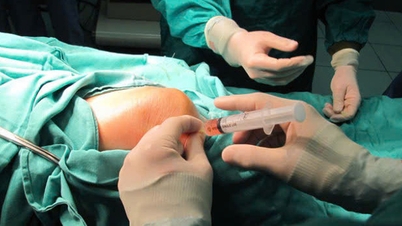
More than 2 years after contracting COVID-19, many people still have reduced smell ability - Photo: AI
A group of American scientists conducted a study on 2,956 people who had been infected with COVID-19 and 569 people who had not been infected to assess the long-term impact of the SARS-CoV-2 virus on the sense of smell.
The results showed that even after an average of 671 days from the first test, many people still had significantly affected their ability to smell.
In the group who had had COVID-19, 1,393 people self-reported a decreased sense of smell, and objective testing confirmed that 80% actually had a decrease or loss of smell (hyposmia/anosmia).
Surprisingly, the remaining 1,563 people thought they were completely normal, but tests showed that 66% also had an affected sense of smell without knowing it.
“People who have had COVID-19 are at high risk for olfactory impairment, a problem that is underappreciated in the community,” said study co-author Dr. Leora Horwitz, of NYU Grossman School of Medicine.
COVID-19 is known to be the leading cause of olfactory dysfunction during the pandemic. The virus can attack cells and receptors in the nasal cavity, causing damage to the nerve pathways that transmit smell signals.
According to the research team, many people do not realize they have lost their sense of smell because their brain is also affected, especially the area that controls sensory perception, making them unaware of this change.
Another theory is that over time, the brain gradually "adapts" to the deficiency, causing the patient to not realize that he or she has lost an important sensory part.
The sense of smell not only brings pleasure when eating or enjoying scents, but also warns of dangers such as gas leaks, fires or spoiled food. Therefore, a silent loss of smell can threaten safety and affect the quality of life.
Scientists have also highlighted a link between loss of smell and neurological conditions such as Alzheimer’s, suggesting that COVID-19 may not only affect the respiratory system but may also impact the brain and cognitive function.
The researchers suggest that olfactory testing should become a routine part of post-COVID-19 health care, especially for people who experienced loss of taste or smell during their infection.
“Even if a patient doesn't realize it right away, a loss of sense of smell can have a profound impact on mental and physical health,” Dr. Horwitz emphasizes.
Experts hope these results will spur further research into the mechanisms of olfactory recovery after viral infection, thereby finding more effective treatments in the future.
Source: https://tuoitre.vn/hang-trieu-nguoi-co-the-da-mat-khuu-giac-sau-covid-19-ma-khong-he-biet-20251017151449524.htm



![[Photo] Immerse yourself in the colorful musical world of “Secret Garden Live in Vietnam”](https://vphoto.vietnam.vn/thumb/1200x675/vietnam/resource/IMAGE/2025/10/18/1760805978427_ndo_br_thiet-ke-chua-co-ten-41-png.webp)

![[Photo] Collecting waste, sowing green seeds](https://vphoto.vietnam.vn/thumb/1200x675/vietnam/resource/IMAGE/2025/10/18/1760786475497_ndo_br_1-jpg.webp)
![[Photo] General Secretary To Lam attends the 95th Anniversary of the Party Central Office's Traditional Day](https://vphoto.vietnam.vn/thumb/1200x675/vietnam/resource/IMAGE/2025/10/18/1760784671836_a1-bnd-4476-1940-jpg.webp)
![[Photo] Closing ceremony of the 18th Congress of Hanoi Party Committee](https://vphoto.vietnam.vn/thumb/1200x675/vietnam/resource/IMAGE/2025/10/17/1760704850107_ndo_br_1-jpg.webp)

































































































Comment (0)